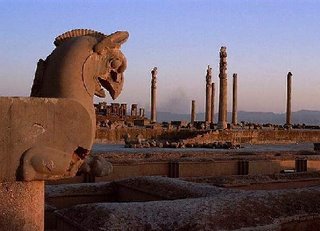
As for Persepolis, the capital of the Persian Empire, Alexander described it to the Macedonians as their worst enemy among the cities of Asia, and he gave it over to the soldiers to plunder, with the exception of the royal palace.
It was the wealthiest city under the sun and the private houses had been filled for a long time with riches of every kind. The Macedonians rushed into it, killing all the men and plundering the houses, which were numerous and full of furniture and precious objects of every kind. Here much silver was carried off and no little gold, and many expensive dresses, embroidered with purple or with gold, fell as prizes to the victors.
But the great royal palace, famed throughout the inhabited world, had been condemned to the indignity of total destruction. The Macedonians spent the whole day in pillage but still could not satisfy their inexhaustible greed. [...] As for the women, they dragged them away forcibly with their jewels, treating as slaves the whole group of captives. As Persepolis had surpassed all other cities in prosperity, so she now exceeded them in misfortune.

Alexander went up to the citadel and took possession of the treasures stored there. They were full of gold and silver, with the accumulation of revenue from Cyrus, the first king of the Persians, down to that time. Reckoning gold in terms of silver, 2,500 tons were found there. Alexander wanted to take part of the money with him, for the expenses of war and to deposit the rest at Susa under close guard. From Babylon, Mesopotamia and Susa, he sent for a crowd of mules, partly pack and partly draught animals, as well as 3,000 pack camels, and with these he had all the treasure conveyed to the chosen places. He was very hostile to the local people and did not trust them, and wished to destroy Persepolis utterly. [...]
Alexander held games to celebrate his victories; he offered magnificent sacrifices to the gods and entertained his friends lavishly. One day when the Companions were feasting, and intoxication was growing as the drinking went on, a violent madness took hold of these drunken men. One of the women present (she was an Athenian called Thais [1]) declared that it would be Alexander's greatest achievement in Asia to join in their procession and set fire to the royal palace, allowing women's hands to destroy in an instant what had been the pride of the Persians.
These words were spoken to young men who were completely out of their minds because of drink, and someone, as expected, shouted to lead off the procession and light torches, exhorting them to punish the crimes committed against the Greek sanctuaries. Others joined in the cry and said that only Alexander was worthy of this deed. The king was excited with the rest by these words. They all leaped out from the banquet and passed the word around to form a triumphal procession in honor of Dionysus.

A quantity of torches was quickly collected, and as female musicians had been invited to the banquet, it was to the sound of singing and flutes and pipes that the king led them to the revel, with Thais the courtesan conducting the ceremony. She was the first after the king to throw her blazing torch into the palace. As the others followed their example the whole area of the royal palace was quickly engulfed in flames. What was most remarkable was that the sacrilege committed by Xerxes, king of the Persians, against the Acropolis of Athens was avenged by a single woman, a fellow-citizen of the victims, who many years later, and in sport, inflicted the same treatment on the Persians.
--------------------------------------------------------------------------------
Note:
She was the lover of the Macedonian commander Ptolemy, a friend of Alexander, his biographer and the future king of Egypt.
The History of the world, 17.20-22
By: Diodorus Siculus (c. 90 - 21 BCE)
Hiç yorum yok:
Yorum Gönder